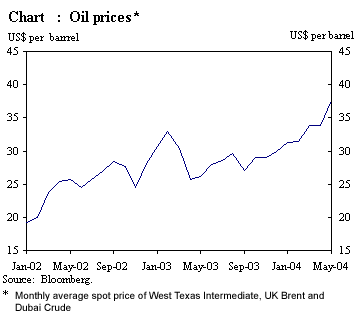Increases in crude oil prices will probably have a negative impact on Hong Kong's economic growth, but this impact is unlikely to derail the economic recovery now in progress.
Between January 2002 and May 2004 crude oil spot prices doubled, from US$19 a barrel to US$38 a barrel. As can be observed from the attached chart, about half of the increase occurred in 2002; the rest occurred more recently in the second half of last year and in the first few months of this year. Although there is expectation of some moderation, as suggested by the prices of crude oil futures, the increases have been quite large and they may have implications for global economic growth and inflation.
Many studies have been conducted over the years on the impact of higher oil prices on the world economy. On this occasion, the possible ranges of the estimated negative effects on growth and inflation seem quite wide, probably reflecting uncertainty about the extent of the "pass-through" to consumer prices and hence the probability of any significant monetary policy response. High productivity growth, made possible by the revolution in information technology, has kept world inflation low for a considerable period. The ability of the world economy to ride an oil price hike smoothly has at the same time and for the same reason been increased. The fact that the large increase in crude oil prices in 2002 has generally not been given much attention in economic reports for the past two years is perhaps a good illustration of this point. Moving into 2004, however, the situation may have changed somewhat. The US economy is in any case doing so well now as to warrant an increasingly likely shift from an accommodative monetary policy stance to a rather more neutral one. Further increases in oil prices may strengthen the probability of that shift. One could therefore be looking at the higher rather than the lower end of the ranges of estimates on the negative impact of oil price increases on growth and inflation.
We have made use of some of the estimates in these studies as input for assessing the possible impact on Hong Kong. The doubling of oil prices from January 2002 to May 2004, assuming conservatively that the current higher level is sustained, could reduce the level of GDP in real terms by around 1% relative to what it would have been had the oil price increases not occurred. But, I hasten to advise, do not take this 1% off the forecast GDP growth rate of 6% for 2004, because some (possibly half) of this impact will already have come through last year. In other words, GDP growth in real terms may only be reduced by 0.5% this year. This is not of a magnitude large enough to derail the economic recovery that we are experiencing. In any case, the official forecast may have already taken into account some increase in oil prices. In particular, to the extent that higher oil prices reflect, in part, the strength of the global recovery, there are offsetting effects on Hong Kong's growth from stronger external demand.
The possible impact of higher oil prices on consumer prices in Hong Kong should be quite minor. We can take comfort from the fact that the oil-related components of the Composite CPI accounted for less than 1% of the Index and that the import component of retail petrol prices is only around 25% to 40%. And the second order effects should also be mild. Although the economy is recovering, it is, given the continuing structural change arising from economic integration with the Mainland, a recovery that involves less job creation than before. Growth of domestic consumer demand will be constrained by the slow improvement in the employment situation, and so there may not be much scope for a total pass-through to consumer prices. Very roughly speaking, we are talking about plus 0.4 percentage point in the CCPI as a result of the doubling of crude oil prices, with at least half of this having already occurred last year. In any case, although deflation, as I have said a few times, is probably over, inflation is not a current concern for us.
The outlook for interest rates, the success or otherwise of macroeconomic adjustment in the Mainland and higher oil prices have combined to produce sharp volatility in financial markets, particularly in Hong Kong. This is partly a reflection of the high degree of liquidity of the Hong Kong market, which makes it the preferred market in which to take quick positions. It is also a reflection of general nervousness at a time when important changes to monetary policy stance are in prospect, which could impact sharply on the cost of funding, particularly for those with leveraged positions in financial markets. But I believe that the economic fundamentals remain robust globally - for Hong Kong they have actually not been so robust for some time - and this should likewise be reflected in the underlying financial market performance.
Joseph Yam
10 June 2004

Click here for previous articles in this column.
Document in Word format


